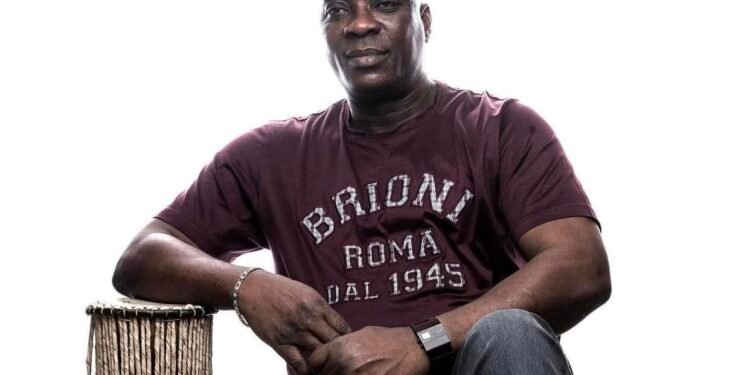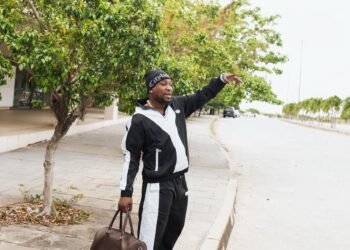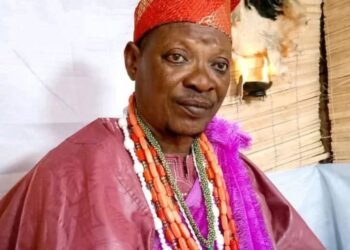Wasiu Ayinde’s Bio: Age, Early Life, Wife, Career, Net Worth
In speaking of the patriarchs of modern African sound, K1 De Ultimate is a legend. A 5-decade-plus music career has his voice at the heart of Yoruba existence, transforming Fuji music from a grassroots ritual to a global phenomenon.
His path started on Lagos’s vibrant streets, powered by raw potential and indefatigable vision. This is the story of a boy from Agarawu who grew up to be the Oba Orin (King of Music), shaping the soundtrack of generations to come. We have resilience, creativity, and controversy; all mixed into the rhythm of Nigeria’s unstoppable musical juggernaut.
Table of Contents
Early Years
Wasiu Ayinde Marshal entered this world on March 3, 1957, in Lagos’ bustling Agarawu district. The 14th child in a family of 16, he grew up surrounded by the clatter of his father’s printing press and market chatter. But young Wasiu’s ears tuned elsewhere: to the hypnotic gangan drums echoing from Egungun festivals down muddy alleys. By eight, he’d slip past his parents to watch street performers, absorbing rhythms like scripture.

Read Also: Who Was Bilikisu Sugbon? Uncovering the History
His father dreamed of courtroom robes, not drumbeats. That changed at 15 when Wasiu won a local singing contest. I’ve heard elders describe it: how his raw, thunderous voice froze market haggling mid-sentence. No training, just pure instinct. People whispered he channelled ancestors through those vocals. When his parents finally accepted that music owned their son, Lagos gained its future Fuji king.
Finding His Rhythm
Wasiu did not just become a member of a band in 1975; he became a musical university student. Loading instruments for Ayinde Barrister’s Supreme Fuji Commanders, he was the maestro’s apprentice. For three hard years, he studied every drum pattern, every flexion of the vocals, every crowd-controlling secret. Barrister was not just teaching music; he was creating an heir.
The ultimate stamp of approval arrived in 1978 when Barrister bestowed on him half of his name, “Ayinde”. This was not just a pseudonym; this was passing the torch.
His 1980 debut, Iba, was powerful, announcing a serious new player. But 1984’s Talazo ’84 exploded like a cultural bomb. This was where K1 truly arrived, birthing Talazo Fuji. Imagine the deep Islamic percussion and dense Yoruba lyrics you were used to, but then suddenly fueled by fiery, jazzy horns and keyboards.
Fuji shed its skin last night. It was no longer relegated to church rituals; it ran through university dorms and busy clubs. My older cousins used to play those cassette records all the time, dancing to rhythms that our grandparents tsked over their heads; too new, too fast, but we couldn’t resist. Wasiu Ayinde had cracked the code, making tradition irresistible to an entire generation.

Wasiu Ayinde’s Global Fame
Wasiu Ayinde didn’t just tour the world, he rewrote its musical map. His 1986 US-Canada run proved Fuji could cross oceans, but 1995’s WOMAD Festival was the real game-changer. This had 50,000 strangers, including Londoners, Japanese backpackers, and Senegalese musicians, all chanting Yoruba lyrics they didn’t fully understand but felt deep in their bones. That’s when Fuji truly went global.
Read Also: VeryDarkMan’s Biography: Real Name, Age, Net Worth
Soon, New York’s SOBs and London’s Hammersmith Town Hall felt like Lagos extensions. I’ll never forget Berlin ’97: Wasiu Ayinde’s hunter-green agbada swirling under stage lights, saxophones duelling with talking drums while he sang about Lagos traffic jams and ancient proverbs in the same breath. No explanations, no apologies; he made the whole room realise African music didn’t need validation, it was the main event.
Royal Honours and Recognition
K1’s impact stretched far beyond music. Traditional rulers saw in him a guardian of culture. The Oba of Lagos started the wave in 1999, naming him Oluomo of Lagos (Voice of the City). Decades later, in 2020, the Alaafin of Oyo went bigger, declaring him Mayegun of Yorubaland, literally Defender of the Heritage. Then last year, 2024, the Awujale of Ijebuland sealed it with the title of Olori Omo Oba Akile Ijebuland (First Prince of Ijebu soil).
These weren’t empty titles. You could trace them to real things: bricks laid in Ijebu-Ode school buildings he funded, the widow cooperatives he quietly supported, young Fuji stars like Pasuma and Olamide sharpening their craft under his watch.
Even the federal government took note. When President Buhari awarded him the Member of the Order of the Niger (MON) in 2022, the moment spoke volumes. There was a sea of starched agbadas and formal suits at Aso Rock on the day of this event.
Then there was Wasiu Ayinde, standing tall in his signature, simple white fila cap. No fancy headgear, no royal beads. Just him. That cap was his statement: My lifelike crown isn’t worn; it’s earned through the people’s respect.
Beyond the Spotlight
Wasiu Ayinde’s triumph was not all commendation. Maintaining his mammoth band was stressful. Think of the seasoned drummer who vented over pay, a public, nasty fight. K1 was belligerent in support of his management, stating that it was “running a small country,” and was quick to increase wages. Another band member hotly responded, citing that their wages exceeded many government workers’ paychecks. And then the Firecracker 2025 airport showdown.
Wasiu Ayinde’s Airport Incident
Then, the explosive 2025 airport clash. Stopped from boarding over a suspect flask, K1 snapped.
Witnesses saw liquid being flung at staff, and the plane was blocked on the tarmac. The fallout? A swift no-fly ban. He later apologised, calling it a heat-of-the-moment mistake, insisting the flask held only water for a health condition. Supporters hotly argued: entitled diva, or a pushed-to-the-edge legend?
His own personal habits did too: openly availing himself of polygamy with wives like Aisha and children, including Fathia. His philosophy was simple: “If life gives blessings, who denies the flow?” The glare, it seems, burns as brightly as it illuminates.
Read Also: King Phoebe Odekina’s Bio: Real Name, Age, Net Worth
Wasiu Ayinde’s Musical Legacy: Sounds That Shaped Generations
K1 didn’t just make music; he reshaped Fuji’s DNA. Across 80+ albums, he smashed boundaries: weaving jùjú guitars into Islamic percussion, braiding highlife horns with traditional chants, even sneaking hip-hop beats under Yoruba poetry. Talazo (1984) shattered limits, and Timeless (2022) proved his genius endures.
Walk into any Lagos studio today, and you’ll hear young artists sampling his iconic drum patterns. Even giants like Burna Boy nod to his influence.
I saw it firsthand last year: Wasiu Ayinde at 68, still creating daily in his Lagos space. He pointed at an old tape machine beside sleek synths. “This?” he smiled. “Old school and new school, always walk together.” That’s his true legacy: sound bridging eras.
Why He Endures
K1’s genius lies in making Yoruba wisdom feel universal. His songs tackle betrayal (Ole), societal greed (Ebi N Pawa), and spiritual strength (Iba); themes resonating from Ibadan to Brooklyn.
That’s why the airport controversy didn’t topple his throne. As market trader Mama Chidi told me: “When K1 sings, my dead father smiles in heaven. Can one mistake erase 50 years of joy?”

Why He Still Matters Today
K1 De Ultimate’s story isn’t just history, it’s Lagos’ heartbeat. Walk its streets right now, you’ll hear his lyrics fueling market banter, anchoring wedding vows, even firing up political rallies. He’s woven into the city’s fabric.
That’s the magic. He’s a walking paradox: fiercely traditional yet relentlessly innovative, generous yet famously strict. Like Fuji music itself, it features complex layers, driving percussion, and is impossible to ignore. Controversies like the airport incident? They’re footnotes against five decades of shaping sound and spirit.
His own words say it best: “Do the right thing, and long after you’re gone, the records remain.”
Read Also: Eric Gugua Biography: Age, Early Life, Brother, Net Worth
For K1, they are not vinyl or streams. They’re the uncle reading his proverbs at the bus stop, the teenager experimenting with his 1984 drums on a laptop, the way his music bridges a diaspora child in London to Abeokuta in an instant.
True royalty is not crowns or titles. It’s resonance. K1’s beat resonates across generations because he made tradition groove. He taught us that our legacy could live, grow, and dance. That’s an inheritance no one can cancel.









